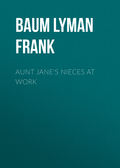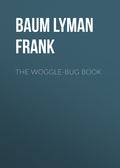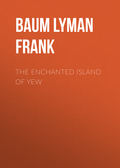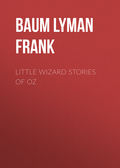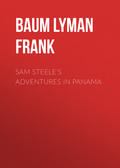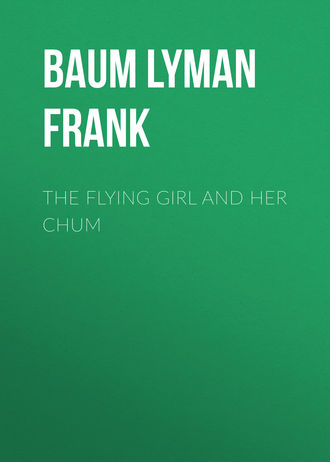
Лаймен Фрэнк Баум
The Flying Girl and Her Chum
CHAPTER XIV
ON THE BLUFF
Sybil clapped her hands gleefully and looked at Orissa in triumph.
"The rubber is mine!" she cried. "You now owe me sixteen boxes of chocolates, nine of caramels and twelve of mixed bonbons – enough to stock a candy store. Tell you what I'll do, Commodore Columbus; I'll pit my desert island and my man Friday against your fleet of galleys and the favor of Queen Isabella, and it shall be the best three out of five games. Are you game, my dear Discoverer?"
Orissa laughed.
"You ought to give me odds, Crusoe, for you are the more skillful checker player," she replied. "But I won't play any more to-day. This heat is dreadfully oppressive and from the looks of the sky I'm afraid a storm is brewing."
"What? A rain storm?" asked Sybil, jumping up to go outside the tent and examine the sky.
"Rain, hail, thunder, lightning and tornadoes; anything is likely to follow a storm in this latitude," declared Orissa, following her. "I think, Sybil, we ought to make all as safe and secure as possible, in case of emergency, while we have the time."
"What can we do?" asked Sybil. "I won't mind the storm very much, if it doesn't have lightning. That's the only thing I'm afraid of."
Orissa examined the sky critically.
"I predict high winds," she presently said, "and high winds might endanger our property. Let us get to the beach, first, and see what may be done to protect the Aircraft."
They found the flying-machine fairly well protected by the walls of the ravine in which it lay, but as the big upper plane offered a tempting surface to the wind Orissa set to work and removed it, a task that consumed two full hours. Then she wired the framework to a big rock, for additional security, and carrying the canvas from the plane between them, the girls returned to their tent.
"Will our house stand much of a wind?" asked Sybil.
"It is rather exposed, on this bluff," replied Orissa, doubtfully. "I think it will be wise for us to pile more rocks upon the edges. The wire will hold, I'm sure, for it is nickel-steel, and if we close the ends of the tents securely we may escape damage."
"All right; I'm glad to have something to do," cried Sybil, picking up a rock. "We'll build a regular parapet, if you say so."
This was exactly what they did. In spite of the oppressive heat the two girls worked faithfully piling the rocks around the tent, until they had raised a parapet nearly half its height. They were inspired to take this precaution by the glowering aspect of the sky, which grew more threatening as the afternoon waned.
Finally Orissa wiped the perspiration from her brow and exclaimed: "That'll do, I'm sure, Syb. And now I'm ready for dinner. What's to eat?"
Sybil made a grimace.
"Bananas and jelly," she replied. "Could you conceive a more horrible combination?"
"Meat all gone?"
"We've part of a baked crab; that's all."
"And the lettuce. I shall have crab salad, with bananas for dessert."
"A salad without lemon or vinegar is the limit," declared Sybil. "I shall stick to bananas and jelly."
Their appetites were still good and Orissa really enjoyed her salad, which she seasoned with salt which they had obtained by evaporating seawater. The bananas were getting to be a trifle irksome to the palate, but as food they were nourishing and satisfying. Neither of the castaways grumbled much at the lack of ordinary food, being grateful at heart that they were able to escape starvation.
The storm burst upon them just after dark and its violence increased hour by hour. There was little rain, and no lightning at all, but the wind held high revel and fluttered the canvas of the tent so powerfully that the girls, huddled anxiously in bed, feared the frail shelter would be torn to shreds.
But the plane-cloth used by Stephen Kane was wonderfully strong and had been sized with a composition that prevented the wind from penetrating it. Therefore it resisted the gale nobly, and after a time the fears of the two girls subsided to such a degree that they dozed at times and toward morning, when the wind subsided, sank into deep sleep. The hooting of the owls no longer had power to keep them awake, and on this night the owls were less in evidence than usual, perhaps deterred from leaving their nests by the storm.
Weather changes are abrupt in the semi-tropics. The morning dawned cool and delightful and the sun shone brilliantly. There was a slight breeze remaining, but not more than enough to flutter Orissa's locks as she unfastened the flap of the tent and walked out upon the bluff to discover if the Aircraft was still safe.
It lay at the bottom of the ravine, in plain sight from where she stood, and seemed quite undisturbed. Orissa turned her eyes toward the distant island, let them sweep the tumbling waves of the ocean and finally allowed them to rest upon the bay at the east, where they had first landed. Then she uttered an involuntary cry that echoed shrilly among the crags.
A ship lay stranded upon the shelving beach – fully half its length upon dry land!
The cry aroused Sybil, who came running from the tent rubbing her eyes and with an anxious face.
"What's up, Ris?" she demanded.
Orissa pointed a trembling finger across the rock-strewn plain to the bay, and Sybil looked and gave a gasp of delight.
"Oh, Orissa, we're saved – we're saved!" she murmured. Then, sinking upon the sand, she covered her face with her hands and began to cry.
But the air-maid was too interested to weep; she was looking hard at the boat.
"Isn't it Madeline Dentry's yacht?" she asked. "Yes; I'm sure it is. Then they've been searching for us and the storm has wrecked them. Sybil, your father and Steve may be on that ship, alive or – or – "
Sybil sprang up.
"Do you see anyone?" she asked eagerly.
"No; it's too far away, and the sun interferes. I'll get the glasses."
She was quite composed now and her quiet demeanor did much to restore Sybil's self-possession. Orissa brought the binoculars, looked through them for a time and then handed the glasses to her chum.
"Not a soul in sight, that I can see," she remarked. "Try it yourself."
Sybil had no better luck.
"Can they all be drowned?" she inquired in horrified tones.
"I think not. They may have abandoned the wreck, during the storm, or they may be hidden from us by the side of the boat, which lies keeled over in the opposite direction from us."
"Can't we go there, Orissa, and find out?"
"Yes, dear; at once. The tide is out, and although there is quite a sea left from last night's hurricane I think we can manage the trip, by way of the sands, with perfect safety."
Each tore a couple of bananas from the bunch and then they ran down the incline to the beach. Knowing every turn in the coast and every difficult place, they were able to scorn the waves that occasionally swept over their feet, as if longing to draw them into their moist embraces.
CHAPTER XV
BOAT AHOY!
The first indication of dawn found anxious faces peering over the side of the Salvador. Passengers and crew gathered at the lower angle and inspected the position of the boat with absolute amazement.
"Never, in all my experience," said Captain Krell, "have I heard of so remarkable a wreck. We struck the only channel that would have floated us; a few yards to either side and we would have been crushed to kindling wood. As it is, we lie high and dry on this shelf – a natural dry dock – and not a timber is cracked."
"Are you sure of that?" asked Madeline.
"Quite sure, Miss Dentry. We have made a thorough investigation. But I do not wish to create any false hopes. Our condition is nearly as desperate as if we were a total wreck."
"You mean we can't get the yacht off again?"
"I fear not. Even a duplicate of that gigantic wave which hurled us here would be unable to float us off, for our tremendous headway carried us beyond the reach of any tide. This island is of rock formation. I know at a glance that a solid bed of rock is under us. Therefore we cannot dig a channel to relaunch the Salvador."
"Couldn't we blast a channel?" asked Mr. Tupper.
The captain merely gave him a reproachful glance.
"To be sure," replied Chesty Todd, seriously. "We'll have Kane invent a sort of dynamite that will blast the rocks and won't hurt the ship. Good idea, Mr. Tupper. Clever, sir; very clever."
Mr. Tupper glared at the boy resentfully, but his wife said in a mild tone of rebuke: "Really, Martin, my dear, the suggestion was idiotic."
The steward came crawling toward them with a coffeepot, followed by a man juggling a tray of cups. It was quite an acrobatic feat to navigate the incline, but they succeeded and everyone accepted the coffee gratefully.
"This place is nothing but a rock; an extinct volcano, probably," remarked Madeline, gazing thoughtfully over the island.
Chesty, having finished his coffee, climbed to the elevated side opposite.
"Here's a far better view of the place," he called. "It's quite a – " He stopped short, staring fixedly at a white speck far up on the bluff beside the low mountain.
They waited breathlessly for him to continue. Then Steve, reading the expression on Chesty's face, quickly clambered to a place beside him. As he looked he began to tremble and his face grew red and then pallid.
"Mr. Cumberford," called the press agent, "bring your glasses, please."
"What is it?" pleaded Madeline.
"Why, something – just – curious, Miss Dentry. We can't say what it is, as yet, but – "
They were all scrambling up the incline by this time and soon all eyes were directed upon the white speck. Mr. Cumberford focused his glasses upon the spot.
"Ah," said he presently; "this interests me; it does, indeed!"
"Is it a – a – tent?" inquired Steve, a catch in his voice.
"Looks like it," was the reply; "but not a regulation tent. Seems more like – like – Here, see for yourself, Steve."
Steve seized the binoculars.
"I think – it's – the – plane-cloth!" he gasped.
Mr. Tupper lost his balance and slid down the deck, landing with a thud against the opposite rail. That relieved the tension and a laugh – the first heard on the Salvador since she left port – greeted the gentleman's mishap.
"Why – if it's the plane-cloth, the girls are alive!" cried Madeline.
"To be sure," added Chesty, with joyful intonation, "and doubtless enjoying their outing."
The discovery changed the current of all thoughts and led them to forget their own calamity. The Salvador carried a small gasoline launch and two life-boats, all of which were in good condition.
"May we take the launch, Miss Dentry?" pleaded Steve.
"I was about to order it lowered," she said. "Can you run it, Mr. Kane?"
"Certainly," he replied.
"Then I shall go with you. It will carry six comfortably, and more uncomfortably; but as we may have passengers on our return trip only four had better go."
Steve ran to assist in lowering the launch. It had to be unlashed from its rack, first of all, and the tank filled with gasoline, the engine oiled and the boat prepared for action. The men worked with a will, however, and within half an hour the launch was lowered to the rocks and slid safely into the water. The landing-steps being impracticable, a rope ladder was lowered and by this means Madeline easily descended to the launch. Mr. Cumberford followed, as a matter of course, but Chesty Todd modestly waited to be invited to make the fourth voyager.
"Come along, sir," said Miss Dentry, and he eagerly obeyed.
"How about food?" he suggested.
The chef, a fat little Frenchman who was much interested in the fate of the Flying Girl and her chum, had foreseen this demand and now lowered a hamper.
"Any water in it?" asked Chesty.
"Certainmente, monsieur."
"All right. Let 'er go."
Steve started the engine and the little craft quickly shot out of the bay into the open sea and took the long swells beautifully. Bounding the point, Kane kept as close to the shore as he dared, making for the place where the bluff began to rise.
"Boat ahoy!" cried a clear voice, so suddenly that they nearly capsized the launch in their first surprise. And there were the two lost damsels prancing and dancing up and down the beach, waving their handkerchiefs and laughing and crying with joy at beholding their friends.
CHAPTER XVI
AN ISLAND KINGDOM
It was a merry reunion, in spite of the dangers that were past and the tribulations that threatened. Because the yacht's deck afforded precarious footing they all landed on the flat rocky shore, where the breakfast, hastily prepared by the chef, was served to the united company.
"My greatest suffering," said Sybil, nestling close to her father, "was for want of coffee. I've dreamed of coffee night after night, and hoped I would be privileged to taste it again before I was called to the happy hunting grounds."
"Ah; that interests me; it does, really," said Mr. Cumberford, filling her cup anew. "But – who knows, dear? – you might have reached the happy coffee-grounds."
They laughed at any absurd remark just now, and when Orissa related how they had subsisted of late on bananas and jelly you may be sure the castaways were plied with all the delicacies the ship's larder afforded.
Most of the day was spent in exchanging stories of the adventures both parties had encountered since the Hydro-Aircraft ran away. Everyone wanted to add an incident or tell some personal experience, and it was all so interesting that no one was denied the privilege of talking.
But afterward, when an elaborate dinner was served in the cabin – the table having been propped level to hold the plates – they began to canvass the future and to speculate upon the possibility of getting to civilization again.
"Our situation is far from hopeless," remarked Steve, who was now bright and cheery as of old. "We have the launch and the life-boats, and Orissa says the Aircraft is in fine condition again. All the trouble was caused by that unlucky aluminum chest – and the fact that my steering gear was too frail."
"I wouldn't call the aluminum chest unlucky," said Sybil. "Without it we should have suffered many privations, for it carried our blankets and provisions as well as our tools."
"But it was unfortunate that you didn't bolt it securely," added Orissa.
"Could we venture some two hundred and eighty miles in open boats?" inquired Madeline.
"We could if obliged to," asserted young Kane. "Of course, after we got into the track of coastwise ships, we might be picked up. But I do not like to abandon this beautiful yacht, which must be worth a fortune and is not damaged to any extent. I believe the best plan will be for me to fly home in my machine and secure a boat to come here and pull the yacht off the beach. There is a whole barrel of gasoline aboard, intended to supply the launch, so there is no longer any lack of fuel for our Aircraft."
They canvassed this plan very seriously and to all it seemed an excellent idea. But the engineer, an Irishman named O'Reilly, respectfully suggested the possibility of getting the yacht launched by means of a tackle, using her own engines for power.
Steve caught at this idea and said they would try it the following morning.
Everyone retired early, for one and all were exhausted by the trying experiences they had passed through. The girls, however, warned them that the owls would interfere seriously with their sleep. It was not an easy matter to rest, even in the comfortable berths, on account of the slanting position of the ship. Those berths on the right side tipped downward and the mattresses had to be bolstered up on the edges to prevent the occupants from rolling out. On the opposite side the sleeper was pushed to the wall and the mattress had to be padded in the corner where the wall and bunk met. But they managed it, after a fashion, and Sybil and Orissa, at least, slept soundly and peacefully, the luxury of a bed being so great a relief from their former inconvenient rock "altar."
The hoots of the owls proved very distracting to the newcomers, and Mrs. Tupper declared she would go mad, or die painfully, if obliged to endure such a screeching for many nights. Even the crew grumbled and there were many tired eyes next morning.
As soon as breakfast was over they set to work to right the yacht, Steve overseeing the work because of his mechanical experience. A pulley was attached, by means of a chain, to a peak of rock on the point opposite the high side of the yacht, and then a strong cable was run through the pulley, one end being fastened to the mainmast and the other to the anchor-windlass, which was operated by the engine. The stoker got up steam and then O'Reilly started the engines very slowly. Lying as it did on a shelf of solid rock, which had been washed smooth by centuries of waves, there was only the resistance of the yacht's weight to overcome; and, although it required all the power the cable would stand, the boat gradually came upright until it stood upon a level keel. Then the men braced it securely with rocks, on either side the bow, to hold it in position, after which Steve declared that part of the task had been accomplished to his entire satisfaction.
It was indeed a relief to all on board to be able to tread a level deck again, for, although there still remained a decided slant from bow to stern it did not materially interfere with walking, as had the sharp side slant.
The next task was to arrange the tackle so that the engines would pull the yacht off the beach into deep water. But in spite of every effort this plan failed entirely. The boat would not budge an inch and after breaking the wire cable again and again, until it was practically useless, the undertaking had to be abandoned.
"It's up to the airship to rescue the party, I guess," sighed Steve, as they sat at dinner after the energetic and discouraging day's work was over.
"Do you know, there's a big island just west of here," said Orissa, thoughtfully. "Through our glasses we could see that it is green and fertile, and I've an idea it is inhabited. Wouldn't it be a good idea to run the launch over there before Steve undertakes his journey, and see if we can't secure help to get the yacht off the beach?"
They all became interested in the proposition at once.
"How far is the island?" asked Mr. Cumberford.
"Only a few miles; perhaps an hour's run in the launch."
"Then let us try it, by all means," proposed the captain.
"We will run over there the first thing in the morning, with Miss Dentry's consent," decided Steve.
Madeline heartily agreed and as the sea was enticingly calm the next morning a party was made up to visit the larger island in the launch.
At first Captain Krell suggested he should go with part of his crew, saying that no one could tell what sort of people might inhabit the island, if indeed any inhabitants were to be found there; but Steve scorned the notion of danger.
"We are too near the American coast to run against cannibals or hostile tribes," he argued; "and, in any event, our mission is a decidedly peaceful one. I'll take my revolver, of course, but it won't be needed. What do you say, Mr. Cumberford?"
"I quite agree with you," replied that gentleman. "I'm going along, if only for the ride."
"So am I," said Madeline.
"Really, my dear!" began Mr. Tupper; but she silenced him with a single look.
"That means I must go as chaperon," sighed Mrs. Tupper.
"I'll be chaperon," laughed Sybil; "but as we shall go and return in a couple of hours I don't believe Madeline will really need one."
"You shall stay comfortably on the yacht, Aunt Anna," said Madeline. "Who else wants to go? We can carry six, you know."
It was soon arranged to add Mr. Radley-Todd and Orissa to the four, thus completing the complement of the launch.
Just before they set off Monsieur Rissette, the alert chef, appeared with his hamper of lunch, for he had an established idea that no one should depart, even on an hour's journey, without a proper supply of food. Then, merrily waving adieus to those on board, the explorers glided out of the bay into the open sea.
Rounding the north end of their islet they saw clearly the large island ahead, and Steve headed the launch directly toward it.
The trip consumed rather more than the hour Orissa had figured on, but it was a light-hearted, joyous party, and they beguiled the way with conversation and laughter.
"I am quite sure," said Madeline, "that I am enjoying this experience far more than I would a trip to Hawaii. Think of it! A chase, a rescue and a wreck, all included in one adventure. I'm rather sorry it's about over and we are to return to civilization."
"Sybil and I have had a glorious time," added Orissa. "Barring the fact that we were a bit worried over our fate, those days when we played Crusoe and Columbus on a forsaken island were full of interest and excitement. I know now that I enjoyed it thoroughly."
"I quite envy you that delightful experience," asserted Madeline.
"Don't," said Sybil. "The adventure wasn't all pleasant, by any means. The hoots of those dreadful birds will ring in my ears for years to come; the food was far from satisfying and I piled rocks and tramped and sweated until I was worn to a frazzle. If we had not invented our checker set I believe we would have become raving maniacs by the time you found us."
As they drew near to the island they found it even more green and beautiful than they had suspected.
"It's queer," said Steve, eyeing the place thoughtfully, "how very imperfect those seamen's charts are. The one Captain Krell has indicates nothing but barren rocks in these seas. Not one is deemed important enough to name; yet here is a good-sized island that is really inviting enough to attract inhabitants."
"And, by Jove, it has 'em!" cried Chesty Todd, pointing eagerly to a thin streak leading skyward. "See that smoke? That means human beings, or I'm a lobster."
"Good!" exclaimed Mr. Cumberford. "That interests me; it does, really. Head around to the right, Steve; that's where we'll find the natives."
Steve obeyed. Skirting the shore of the island he rounded the northern point and found before him a peculiar inlet. The shore was rocky and rather high, but in one place two great pillars of rock rose some fifty feet in the air, while between them lay a pretty bay which extended far inland. They afterward found this was the mouth of a small river, which broadened into a bay at its outlet.
As the launch turned into this stretch of water, moving at reduced speed, their eyes were gladdened by one of the loveliest natural vistas they had ever beheld. The slope from the table-land above to the inlet was covered upon both sides with palms, flowering shrubs and fruit trees, all of which showed evidence of care. A quarter of a mile up the little bay was a little dock to which were moored several boats. The largest of these was a sixty-foot launch, which made Madeline's little craft look like a baby. Two sailboats and a trio of rowboats, all rather crude in design, completed the flotilla. On the end of the dock two men stood, motionless, as if awaiting them.
"Why, they're not natives at all," exclaimed Sybil, in a low voice. "They – they're clothed!"
So they were, but in quite a remarkable fashion. Their feet were bare, their trousers ragged and soiled; but they wore blue vests highly embroidered in yellow silk, with velvet jackets and red sashes tied around their waists. Add to this outfit, peaked Panama hats with broad, curling brims, and a revolver and knife stuck in each sash, and you will not wonder that our friends viewed this odd couple with unfeigned amazement.
One was a tall, thin man with but one good eye, which, however, was black and of piercing character. His face was sullen and reserved. The second man was short and fat, with profuse whiskers of fiery red and a perfectly bald head – a combination that gave him the appearance of a stage comedian. The skin of both was of that peculiar dingy brown color peculiar to Mexicans and some Spaniards.
The little one, with hat in hand, was bowing with exaggerated courtesy; the taller one stood frowning and immovable.
When Steve steered the launch alongside the dock a broad roadway came into sight, leading through the trees to the higher elevation beyond, where stood a white house of fair size which had a veranda in front. The architecture was of Spanish order and in its setting of vines and trees it looked very picturesque. There were climbing roses in profusion and gorgeous beds of flowers could be seen in the foreground.
Despite the appearance of the two men, who might easily be taken for brigands, the place was so pretty and peaceful and bore such undoubted evidences of civilization that the visitors had no hesitation in landing.
Chesty leaped to the dock first and assisted the three girls to alight beside him. Mr. Cumberford followed and Steve tied up to an iron ring in the dock and also stepped ashore. The tall man had not moved, so far, except that his one dark eye roved from one member of the party to another, but the little fat man continued to bow low as each one stepped ashore, and they accepted it as a sort of welcome. Neither had uttered a word, however, so Mr. Cumberford stepped forward and said:
"Do you speak English?"
They shook their heads.
"Ah! that is unfortunate. Can you tell me, then, the name of this island, and who inhabits it?"
"Of course not, Daddy," cried Sybil. "Try 'em in Spanish, Steve."
But before Stephen, who could speak a little Spanish, had time to advance, the men turned abruptly, beckoned the strangers to follow, and deliberately walked up the broad pathway toward the dwelling.
"Well?" inquired Steve, doubtfully.
"Let's follow," said Chesty. "I've an idea these are hired men, and they're taking us to be welcomed by their master."
"Interesting, isn't it?" muttered Mr. Cumberford, but with one accord they moved forward in the wake of their guides.



